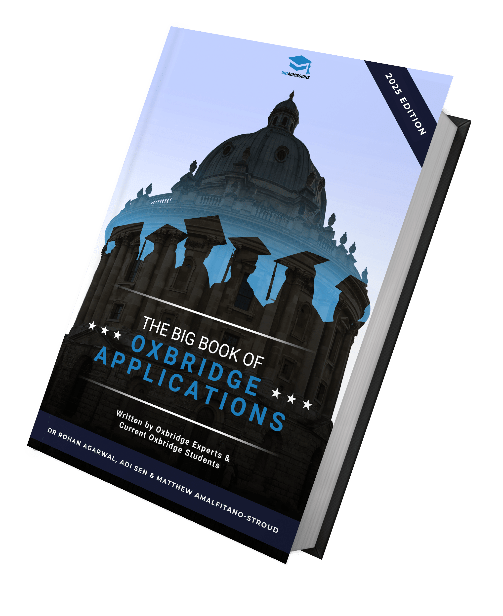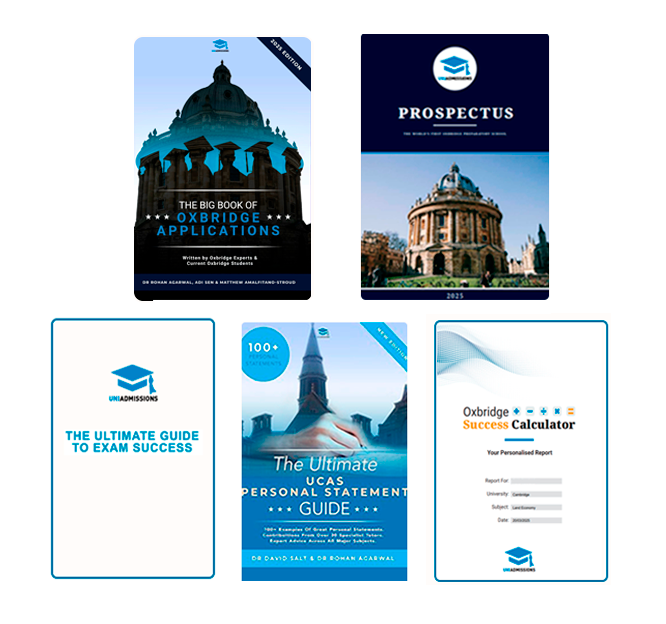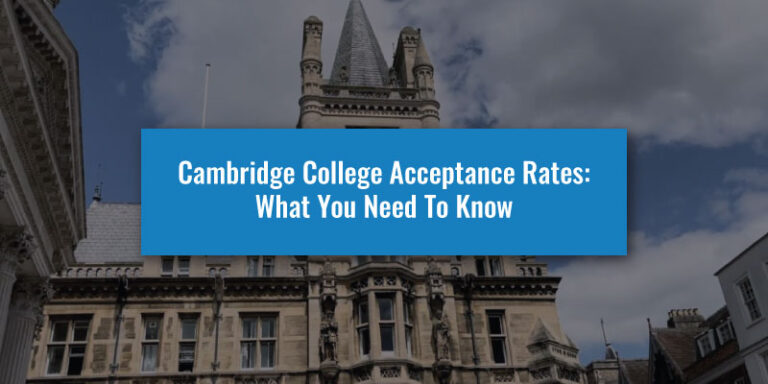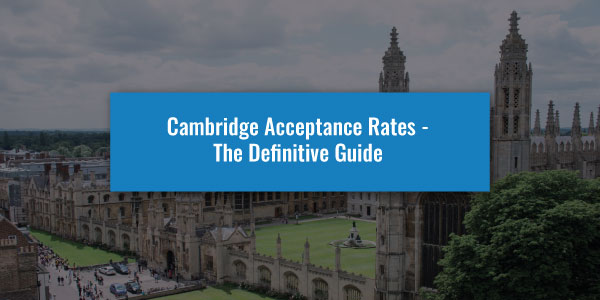After completing your UCAS Application, Personal Statement, and admissions test, the interviews are the final major step in the Oxbridge Computer Science application process. You’ve likely put a lot of work in thus far, but for many, this is the most challenging stage of the process. Whether due to nerves, issues with communication or uncertainty about what to expect, many applicants dread these interviews.
What’s more, a lot depends on your interview success because success rates are incredibly low for Computer Science at Oxbridge (6.4% at Oxford and 7.6% at Cambridge), mostly due to how competitive the course is and how highly-rated the universities are. The good news is that, if you’ve been invited to interview, the university already sees you as a viable candidate.
At these interviews, the admissions tutors want to understand more about you, specifically your motivations, your academic skills and your general approach to education and problem-solving. In this guide, we’re going to look at the types of questions that admissions tutors generally use to assess these things and show you how you can tackle them effectively.
Oxbridge Interview Format
First, let’s cover the FAQs of Oxbridge interviews. We cover the basics in more detail in our Oxford Interview Guide and Cambridge Interview Guide, so check those out if you’re looking for more detail.
When Are Oxbridge Computer Science Interviews?
The main round of Oxbridge interviews takes place during the first week of December. A timetable of interview dates by subject is released in advance, but your invitation will provide all the specific times and dates you need to know.
When Do Oxford and Cambridge Send Interview Invitations?
You should receive your invitation for your interview between one and three weeks ahead of your interview dates. This is nowhere near enough time to prepare, so be sure to start your preparation well before you’re due your invitation.
How Many Applicants Do Oxford and Cambridge Interview?
Despite both being highly competitive, the likelihood of getting an interview varies greatly between the universities. Oxford are very selective in its shortlisting process, only offering interviews to 20% – 30% of applicants on average (only 19% were interviewed for Computer Science between 2022 and 2024).
Cambridge is more generous with their interview invitations, generally seeing around 70% of its applicants. However, this does vary slightly between subjects and colleges.
Where Are Oxbridge Interviews Held?
Since 2020, most Oxbridge interviews have been conducted remotely, allowing you to participate from home or school via Microsoft Teams or Zoom (your invitation will specify the platform you need to use).
Oxford has confirmed that all interviews will continue to be held online for the next few years, but at Cambridge, some colleges still offer in-person interviews, either as an option or a requirement. These are held on the college campus, with full details on where to go provided in your invitation.
How Many Interviews Will I Attend?
Oxbridge applicants will typically be invited to at least two interviews in December, which are generally split into different themes/subjects.
Who Will Be Interviewing Me?
Your interviewers are generally admissions tutors and lecturers from the college you applied to who work within your subject areas. Each interview usually includes two interviewers, but you’ll rarely meet the same one twice.
What Format Are The Interviews?
Oxbridge interviews are always conducted in a traditional panel format, where you’ll engage in a back-and-forth conversation with your interviewers and answer their questions. You will also be asked to work through problems related to Computer Science, which could involve analysing a reference image or data.
If your interview is in person, you will be given paper to write and draw on. For remote interviews, a digital whiteboard will be available in the virtual meeting room for you to use during the interview.
How Long Are The Interviews?
Your interviews will last around 30 minutes each. There won’t be any extra time granted, so you’ll need to ensure you make the most of the time you have available.
What Happens After My Interviews?
After the final interview, the main application process is complete, and there isn’t anything else you can do until your offer comes in or you are contacted for any other reason.
If your college declines your application, another college may consider you instead, giving you a second chance at admission. This is more common at Cambridge, where the process is known as the Winter Pool. Some applicants in the pool may be invited for another interview in January, while others may be accepted without any additional interviews.
That’s the basic information relating to interviews at Oxbridge. Now, let’s move on to the part that is most important – the questions!
Triple your chances of getting into Oxbridge with UniAdmissions
If you’re struggling with any aspect of the Oxbridge Computer Science application process, UniAdmissions is available to support you through every step. From Personal Statements to admissions tests, interviews and general tasks, our programmes feature everything you need to get your offer.
Discover our Oxbridge Computer Science Programme by clicking the button below to learn how you can enrol and triple your chances of success.
Common Oxford and Cambridge Computer Science Interview Questions
While there are no official categories for what questions you could be asked in your interviews, there are six general themes/types that most interview questions can fall under:
- Generic Questions
- Subject-Related Questions
- Academic Questions
- Reading-Related Questions
- Personal Statement Questions
- Thinking Questions
While each of these questions is helpful to the admissions tutors in some way, Computer Science interviews tend to favour certain ones over others. However, let’s analyse them all to understand what you can expect from each.
Generic Questions
These are the kinds of questions you’d anticipate in a standard interview. Although they’re easy to predict, they can be challenging to actually answer on the day if you aren’t prepared. Usually, these questions focus on your motivations and explore why you’re attending the interview. Examples include:
- Why Computer Science?
- Why Oxbridge?
- Why this college?
When answering a question like this, be sure to remain authentic and truthful rather than just thinking about what the interviewer wants to hear. Giving generic reasons for your motivation isn’t going to make you stand out or appear enthusiastic about studying at Oxbridge, so it’s best to go with your gut, even if you’re not sure your reasoning will be interesting enough.
Subject-related Questions
For STEM subjects like Computer Science, subject-related questions will be incredibly common. This type of question tends to be more general, where the interviewer might ask about your understanding of a topic or your opinion on something specific.
In these cases, they don’t expect you to have a complete grasp of every concept in the subject and expect some applicants to be less familiar with the topics that are brought up. The tutors want to see how you use your current knowledge to discuss a topic or solve a problem creatively, even if you don’t know all the necessary knowledge straight away.
The key to answering these questions is to think out loud while working through your thoughts. Since you won’t have a ready-made answer, it’s important to take time to consider the question carefully. A brief pause is fine, but the main purpose is to see how you approach problem-solving. Explaining your thought process as you go is the best way to demonstrate this.
Academic Questions
This is the most common type of question you’ll encounter in your interviews, as Computer Science interviewers are extremely interested in how you can solve mathematical and algorithmic problems. Essentially, the interviewer will present you with a problem to solve, similar (though not identical) to what you might find in an exam.
Depending on your understanding of the problem, these questions can be pretty easy to answer, though bear in mind that the interviews aren’t just looking for the correct solution. You will also need to explain your thought process as you work through the problem, as this is more valuable to the interviewers. You’ll be provided with paper or a digital whiteboard (depending on the format of your interview), so make sure to visualise your steps as you go.
We’ll be focusing on these more in the next section, as there are many different ways these questions could be approached.
Reading-Related Questions
You should have undertaken wider reading during your application relating to your subject, so interviewers may sometimes ask about what you’ve read and your opinions on it. Alternatively, they question you on news stories or new developments in the field of computing, so make sure you’re following the industry and are aware of any major stories.
Possible questions in this category include:
- Tell me about something you’ve read recently.
- What did you think about X?
- Did you see about X in the news?
Wider reading isn’t restricted to books either, so don’t hesitate to discuss articles, papers, news stories, or documentaries you’ve recently encountered if they are relevant.
Personal Statement Questions
These questions are straightforward and relate to your Personal Statement. However, they are less common because Oxbridge admissions tutors generally place less emphasis on your Personal Statement and focus more on assessing your relevant academic abilities.
If an interviewer does bring up your statement, they will likely be looking for more information about an experience you’ve had or a super-curricular activity you’ve engaged in. These questions are easy to handle; simply provide additional context about what you wrote and be honest in your response.
Thinking Questions
These are often called “weird” questions because they can seem abstract or unrelated to the course. However, they are meant to assess your general thinking abilities, such as critical thinking and problem-solving in unusual scenarios. While they aren’t intended to throw you off, they may cause you to pause and think for a moment (just be mindful not to stay silent for too long).
You may encounter weird questions in your interviews, but these will mostly be relevant to mathematics and computing. Oxbridge interviewers like to provide maths and logic problems within strange scenarios and contexts, which we’ll learn more about in the next section.
Now that we have a grasp of the common types of questions asked in Oxbridge interviews, let’s explore some worked examples of Computer Science interview questions.
Access "The Big Book Of Oxbridge Applications" For FREE
Are you considering applying to Oxford or Cambridge? The Big Book of Oxbridge Applications is your must-have resource. Whether you’re exploring colleges, preparing for admissions tests, mastering your UCAS application, crafting a standout Personal Statement, aiming for exam success, or preparing for your interviews, this free book will be invaluable to your preparation. Through over 350 pages, you will find:
- Over 40 admissions test practice questions
- 28 example Oxbridge Personal Statements
- Interviews with Oxbridge students and graduates
- Additional downloadable resources

Access "The Oxbridge Application Vault"
- 300+ page ebook for Oxbridge Applicants
- 25 page ebook for Personal Statement
- 2h+ online course to succeed in any exam
- Online Oxbridge Success Calculator
- 12 page ebook about UniAdmissions

Example Cambridge And Oxford Computer Sciecne Interview Questions
Let’s look at five questions that could be seen at an Oxbridge Computer Science interview. These questions are all very specific and focus on subject-relevant problems, so don’t expect to see these exact questions in your interviews. However, look at the answers provided for each of these to help you in your preparation and consider how you would answer a question like it in your interviews.
When it comes to Academic Questions in a Computer Science interview, there are two key areas that you’ll be tested on. The first is your Pure Maths capabilities.
Oxbridge Computer Science Interview Question 1
Which is larger as n tends to infinity: 222n or 100100n?
How to Answer
Our first pure maths question is a pretty simple one if you understand logarithms. You only have two options, but you can’t just guess if you don’t know, as you’ll need to explain your reasoning. If you’re unsure of how to answer, just consider the different avenues of thought that could lead to the solution (remember to explain everything you’re doing).
Model Answer
Repeatedly taking the logarithm (base 2) of both terms yields the terms 2n and an + b (for constants a and b), and as tends to infinity, the exponential term will be larger than the linear term. So the answer is 222n.
Interviewers will almost always elaborate on simple questions like this if you get it right, so consider these follow-up questions:
Just by describing your approach, how would you show that exponentials are larger than linear expressions for large input values?
Model Answer
Using derivatives to show that one is greater than the other past some value of n.
What feature/property of logarithms and exponentials means that they preserve inequalities?
Model Answer
The fact that both are (strictly) increasing functions.
Your responses don’t need to be drawn out if they don’t need to be. Concise answers that get the point across allow the interviewers more time to ask more interesting questions.
Oxbridge Computer Science Interview Question 2
There are 10 people sat around a circular table. Each person is assigned a different number from 1 to 10 inclusive. Show that there is at least one group of 3 people sitting next to each other whose numbers sum to 17 or more.
How to Answer
Maths questions will often be presented in real-world scenarios like this. Sometimes, they’re simple; sometimes, they’re more abstract or silly. No matter how strange the question may sound, there is always a reason for the question being asked – in this case, it’s a mathematical problem with additional context.
When answering a question like this, take a second to unpack all of the additional information to strip the question to its core – what is being asked of you, what is the intended outcome, what figures and facts do you have to work with?
Model Answer
Adding all possible adjacent triplet sums leads to 3 times the sum of the numbers from 1 to 10, or 165. This means the average triplet value is 16.5, and for the average to have this value, at least one triplet must have a sum of 17 or more (since if every triplet’s sum was 16 or less, the average could not be 16.5).
Next, let’s take a look at Algorithmic Questions, a topic that is extremely important in Computer Science.
Oxbridge Computer Science Interview Question 3
A monkey has a pile of black and white beads and an urn which contains some black and white beads. In the urn there are 34 black beads and 23 white beads. The monkey repeats the following process:
- The monkey randomly takes two beads out of the urn (no replacement).
- If the beads are the same colour, the monkey puts a black bead back.
a) If the beads are different colours, the monkey puts a white bead back. Does the monkey’s process eventually stop? If so, after how many turns?
b) The monkey eventually ends up with one bead in the urn. Can we know for certain which colour the last bead is? If so, which colour is that?
How to Answer
This is exactly what we mean when we talk about questions that sound weird at first. However, the intention behind this one is pretty clear early on. Don’t worry about the monkey and focus on the beads!
Model Answer
For the first part, yes, it does, after 56 repetitions. In every repetition, the monkey takes 2 beads out and puts 1 bead back, so 1 bead is lost on every repetition. The process cannot continue with only 1 bead left in the urn, so there are (23 + 34) – 1 or 56 repetitions.
For the second part, the monkey is certain to end with a white bead. In every possibility for the beads taken out and put back in, the number of white beads either decreases by 2 or stays the same. Since there are an odd number of white beads to start with, there is always an odd number of white beads in the urn. This means there cannot be 0 white beads left, and since the number of beads continually decreases, there will eventually be 1 white bead left.
Oxbridge Computer Science Interview Question 4
Jill bets Jack that she can do the following trick. Jack will recite 99 different numbers from 1 to 100 in a random order, and she will be able to name the only number in that range that he didn’t say. Jill cannot take any notes or write anything down.
What is the best way for Jill to perform the trick, and can you write down a formula to express your answer?
How to Answer
This question asks you to both provide a solution and write the formula to express your solution. However, it’s best practice to try and provide formulas for every answer you prove that requires one. The fact that it is specifically requested here just means that you’ll have a bit more time to present it in a more proper fashion.
Model Answer
Jill can add up the numbers that Jack says as a running tally (modulo 100, for efficiency – in other words, only remembering the last 2 digits when doing the additions). Whatever number is required for Jill to get from her final sum to 5050 (or 50, modulo 100) will be the missing number.
The formula would go as follows:
If sum < 50, then value = 50 – sum, else value = 150 – sum
Oxbridge Computer Science Interview Question 5
The first 50 positive integers, 1, 2, …, 49, 50, are written down on a board. The following operation then occurs: select two of the numbers on the board, a and b, write down the absolute value of their difference | a – b | on the board, and then erase both a and b. The operation is repeated until there is only one number left on the board. How many times is the operation repeated, and what are all of the possible values of the final number that can be obtained from this process?
How to Answer
This question is a lot more to the point, so your answer should be as well. However, there is still quite a lot to take in here, as it can be harder for some to hear an operation explained verbally rather than it being written down. If you don’t get the whole thing straight away, don’t be afraid to ask for part of or the whole question to be repeated again.
Model Answer
The operation is repeated 49 times, as each operation subtracts one number from the board of 50. The value given at the end of each operation doesn’t affect the amount of numbers remaining on the board, and the 50th operation cannot be completed as two numbers are required.
Looking at the second part of the question, all odd numbers are less than 50. For each repetition, when numbers a and b are picked (where, without loss of generality, a is smaller than b), the sum of all numbers is reduced by a + b – (b – a) = 2a. Since the sum is initially 1275, the sum will stay odd.
The final number cannot be larger than 50 since only absolute differences of numbers are written back down. Every odd number k less than 50 can be made by subtracting 1 from (k + 1) and then making 24 ones by the pairs: (2, 3), (4, 5), …, (k – 1, k), (k + 2, k + 3), … (49, 50).
The 24 ones can be used to make 12 zeroes, which then leave just k.
These are just five examples of questions that could arise in your interviews. Since Computer Science is such a vast subject, the likelihood of encountering these specific questions is low, but the purpose of these examples is to illustrate how you can effectively tackle any problem-based interview question to provide a thorough and insightful response.
In these interviews, admissions tutors are looking to stretch your abilities as far as they can go, so don’t be discouraged if you’re less confident in the topics covered in these examples. All of the questions in your interview will be based upon concepts that you should have learnt during your A-Levels, so everything you’re asked will be achievable at your level of knowledge, provided you prepare effectively and give yourself time to work through the question carefully.
Oxbridge Computer Science Interview Tips
To finish this guide, here are some more general tips that will help you through your interview:
Be Early
As with any important interview or appointment that you attend, aim to arrive 10 to 20 minutes early. For remote interviews, ensure your computer is properly set up and that your camera and microphone are tested. Plus, ensure that you won’t be interrupted during the interview, as any disruptions could hurt the flow of your interview. If your interview is in person, give yourself plenty of time to get to the college, as it is difficult to navigate the colleges without having been there before.
Remain Calm
This is incredibly generic advice, but it can be easy to forget. Interviews are stressful events, and there’s no problem with feeling that stress. However, as an Oxbridge applicant, you need to be able to take action and control your nerves to prove that you have what it takes to be an Oxbridge student.
The interviewers expect applicants to be nervous, though it will depend on who you’re speaking with as to whether they are welcoming and reassuring or stern and unsympathetic. Either way, it’s your job to assert yourself and prove that you are worthy of an offer.
Think Out Loud
We’ve already covered this multiple times, but we can’t understate how important this is. The whole point of the interview is for the college to understand how you work as an academic, so keeping your thoughts to yourself and making the interviewers sit in silence for minutes is almost a guarantee for failure.
When thinking out loud, not everything you say has to be clever or even right; the whole point is to verbally explain your thought process, which may lead to some experimentation and, inevitably, some mistakes. As long as you think logically and reasonably, you will be giving the interviewers exactly what they want.
Opinions Don’t Matter
This is less relevant for a Computer Science interview due to the objective nature of the subject, but don’t be afraid to stand by your opinions where necessary. When discussing your thoughts on a topic, your feelings are less important than your ability to back up your reasoning with logic and facts, as well as your personal interpretations of more subjective matters. Therefore, it’s better to be truthful and explain the reasoning you believe rather than changing your beliefs and trying to justify something you don’t believe.
Use Visuals
This is crucial for a Computer Science interview and something you should be regularly practising. Given the visual nature of the subject, many elements in equations and diagrams cannot be effectively communicated verbally. To provide thorough explanations of your thought process, writing and drawing your work is the best way to demonstrate your understanding to the admissions tutors.
When preparing for your interviews, focus on improving the speed of your work while ensuring that everything remains legible. It doesn’t have to be perfect since you can also explain things verbally, but it’s good practice to keep your drawings and written explanations neat and legible.
That concludes our guide to the Computer Science interview questions at Oxford and Cambridge. While everything we’ve covered here serves as a solid foundation, it’s just the beginning of your research and preparation. Your next steps should include continuing to revise the subject knowledge required for Computer Science and starting to practice through mock interviews. Taking part in multiple mock interviews, ideally with someone you’re not familiar with, will help you improve your technique and ease any nerves ahead of the actual interview.
Remember, start your preparation long before you get your invitation – starting at the last minute will put you at a great disadvantage compared to other applicants. While there are many tasks to juggle in the months leading up to December, it’s crucial to manage your time well and ensure every part of your application (including your school work) is strong enough to compete with the top 10% of Oxbridge applicants. These questions may also come up in Imperial College London Computer Science interviews, though not all applicants will need to attend one of these.
If you’re finding it difficult to start this preparation or feel your current preparation methods aren’t effective, UniAdmissions has a proven track record of boosting interview performance and getting more students into Oxbridge than any other programme on average. We have a Computer Science Interview Programme available, but our premium Computer Science Preparation Programme is designed to help students with not only their interviews but their MAT/TMUA, Personal Statement and general application tasks, too. We’ve had ten years of experience getting over 1,100 students into Oxford and Cambridge, so our programmes are proven to work!
Our students benefit from one-to-one tutoring with experienced tutors, mock interviews, live sessions, access to a vast resource library and much more – all available through the exclusive UniAdmissions Portal. If you’re ready to triple your chances of getting your place at Oxbridge, book a free consultation today to learn more about enrolment. Best of luck!
Get into Oxbridge Computer Science with support from UniAdmissions
With our Oxbridge Computer Science Programme, you’ll have access to everything you need to succeed in every step of the application process. Through one-to-one tuition, mock exams, live courses and extensive materials, you’ll develop key skills for Oxbridge applicants and impress your admissions tutors.
Discover our Oxbridge Computer Science Programme by clicking the button below to learn how you can enrol and triple your chances of success.






